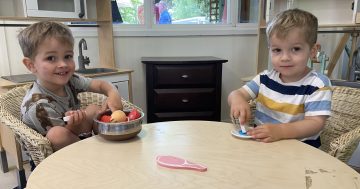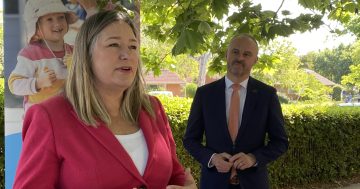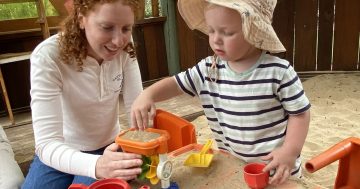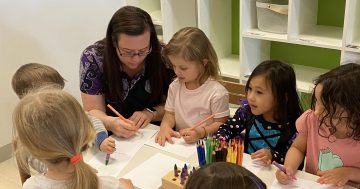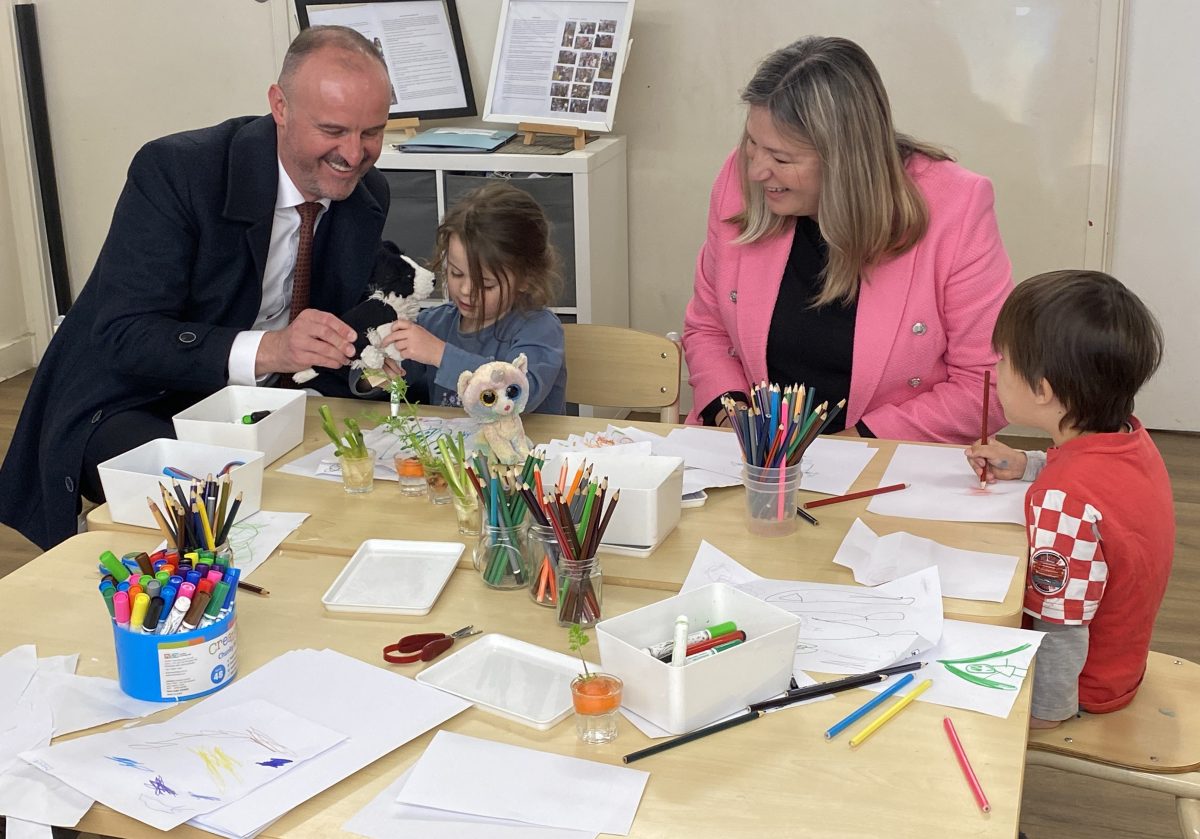
Three-year-olds at the Majura Early Childhood Centre show Chief Minister Andrew Barr and Education Minister Yvette Berry the benefits of educational play. Photo: Claire Fenwicke.
If your child is turning three before 30 April 2024, they’ll now be eligible for one fee-free day of preschool every week.
The ACT Government unveiled more than $50 million over the next four years to invest in the sector as part of its pre-Budget announcements.
It’s expected to give an estimated 5000 Canberra three-year-olds access to a day of free early childhood education.
Chief Minister Andrew Barr said this was “one of the best investments” that could be made in a Territory budget.
“We know that investing in the education of our children provides life-long benefits and sets them up for the best chance of success,” he said.
“The three-year-old preschool measure is not only important for equitable access for Canberrans, but it will also help families with young children address the rising cost of living.”
It’s expected the move will save the average family with a three-year-old preschooler about $1329 a year.
Early Childhood Australia CEO Samantha Page said giving younger children access to free preschool made a “significant difference” in reducing their vulnerability when they transition to school.
“We know two years of a quality preschool program can make a very significant difference in children’s long-term educational outcomes and wellbeing,” she said.
It’s also expected to create an economic incentive for women to return to the workforce.
“Australia has one of the lowest levels of participation of women in the workforce and more part-time hours than women anywhere else in the developed world,” Ms Page said.
“That suggests that the cost of early childhood education is a real barrier to women working in this country, and we really do need to address that.”
While the ACT Government aims to provide 15 hours of fee-free early childhood education to three-year-olds, it has no timeline for when this will happen.
Education Minister Yvette Berry said it wasn’t possible to commit to a date given the current shortages in the workforce.
“We have a workforce crisis at the moment, which is why we’re investing in the workforce to ensure that they are qualified in the sector to be able to provide the preschool education and also the physical, actual capability of services to be able to provide free and universal access to early childhood education,” she said.
“So we’ve been really careful as we’ve provided this funding, phasing it in, to ensure we that have a workforce able to provide quality early childhood education, investing in the sector and the workforce, to make sure that’s possible.”
Ms Page agreed that while expanding the free days beyond one day a week would be great, it’s not possible at the moment.
“In order to expand beyond the one day, we need to make sure that we have enough early childhood teachers and educators to deliver those services, as well as enough physical buildings and services to provide support to families, wherever they are across the ACT,” she said.
“One day is a start, and we’d like it to expand in the future.”
The more than $50 million also includes funding to:
- survey the ACT’s early childhood education and care workforce capacity and needs
- establish a professional learning and development resource portal for early childhood education and care services
- establish a Professional Learning Network and collaborative learning communities for early childhood educators across the Territory
- establish a partnership with the early childhood sector to deliver wrap-around support, including study financial assistance and paid leave, coaching and mentoring for people studying early childhood education
- provide scholarships for Aboriginal and Torres Strait Islander educators working in Koori Preschool to increase their qualifications.
Ms Berry said this was about attracting and retaining skilled workers in the sector.
“We have to carefully work through this because we don’t want this to fail. It has to be successful every step of the way, for young people and the sector,” she said.
“Those investments are what is needed to make sure the early childhood sector can sustain a program like this.”
Northside Community Service CEO Anna Witty said that despite the challenges in having spots available for children to access early childhood education, this investment would send a message to the sector that the work they do was “valued and taken seriously”.
“There will always be issues, I think, with occupancy, but I think in terms of stabilising and supporting the workforce, it’s one of the most important things we can do at this point in time,” she said.
“Early childhood educators do the most complex, important work, and this will mean they will be able to access professional, high-quality development that will support them in the work that they do each and every day with and alongside children.”












